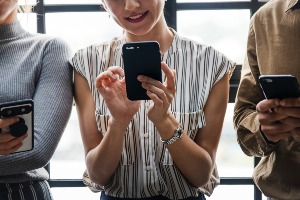
Smartphone owners and conspiracy theorists are worried that their conversations are being listened to and recorded. This is an unsettling problem that needs to be addressed.
Conspiracy theorists are increasing the paranoia that smartphones are monitoring peoples' dialogues. A self-described conspiracy theorist once experimented to determine whether apps actually listen to what the user says. For five days, he talked around his phone about needing cheap shirts and going back to college. Soon, he started seeing ads about shirts and university classes on his Facebook feed.
In an attempt to answer this question, five computer scholars from Northeastern University conducted a controlled year-long study to see whether or not apps monitor and record conversations. The researchers found no evidence of smartphones activating the microphone without user action. Be that as it may, they discovered that apps record the users' screen and send that information to third-party apps. They used over 17,000 of the most popular apps on Android and found that over fifty percent of those apps had been granted the right to access the camera and microphone by the user. As the academics dug further into research, they concluded they were not yet able to determine if a device secretly listens to the user. Their evidence was not solid enough to include in their studies about phones eavesdropping.
In one of the experiments at their university, they placed a phone in a lab. There was too much conversing for the phone to transcribe, so instead they relocated the phone in a closet and played a podcast near it on repeat. They were unable to conclude that the phone heard or recorded the podcast.
The researchers did find, however, that some apps did capture screenshots and video recordings and sent them to third-party apps. One example was an app called GoPuff, an easy-access app that delivers snack foods for those who have certain cravings. The GoPuff screen recorded a user's actions and sent it to a mobile analytic service, Appsee, and also sent geographical information such as their zip code. Appsee even admitted to being responsible for screen recording. The researchers were surprised that neither service provided more information in their privacy policies about the personal information that they sent to third-parties. These apps were not careful about obtaining user consent.
Smart phone users feel like they are being watched and heard and in a way, they are. Smart phones do record information to a certain extent, and this is leading people to an inevitable amount of paranoia. Regardless of this issue not yet being resolved, we, the people, have the right to be asked, and granted consent, before our privacy is disclosed.
[Source:
Gizmodo.com
]

